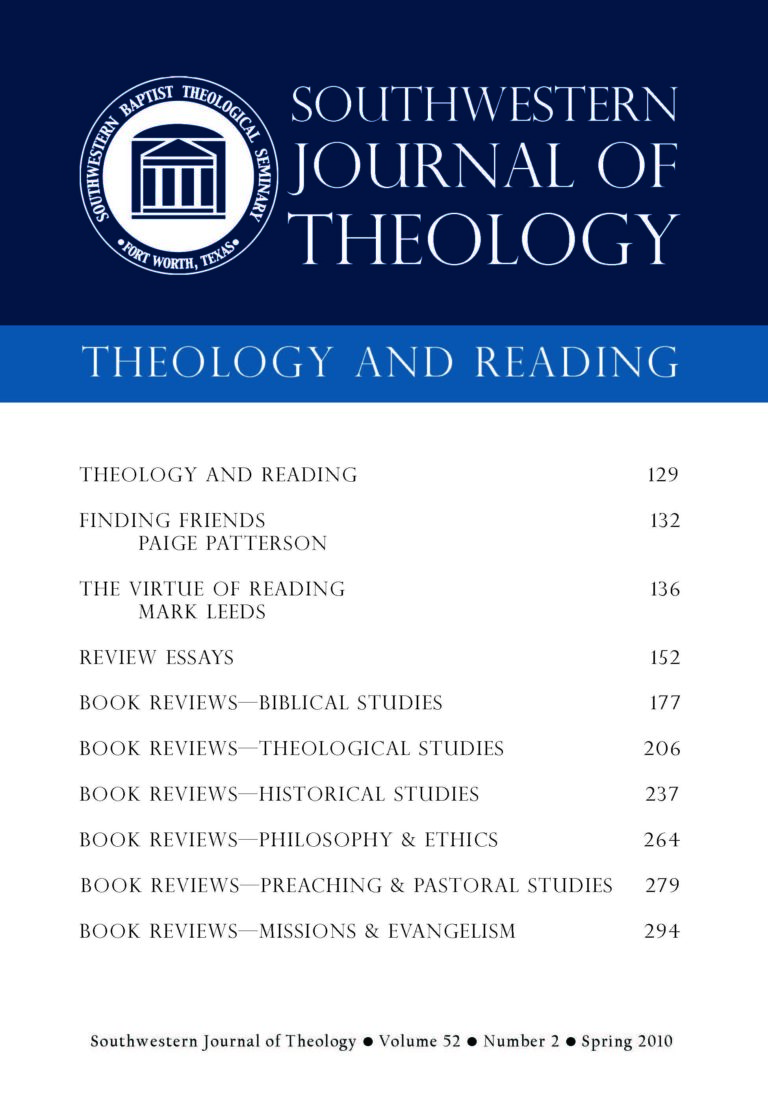
Theology and Reading
Southwestern Journal of Theology
Volume 52, No. 2 – Spring 2010
Managing Editor: Malcolm B. Yarnell III
By Peter Vardy. Peabody, MA: Hendrickson, 2008. 109 + xv pages. Softcover, $14.95.
Peter Vardy’s An Introduction to Kierkegaard is an astonishing feat; he has managed in relatively few words to summarize and share the essence of this Danish philosopher. Beginning with Kierkegaard’s troubled childhood and particularly focusing on his relationship with his father, Vardy forms a compelling reading of his life and his thoughts for any student of philosophy or those simply seeking to reach an adequate understanding of the philosopher.
Vardy’s unique position on Kierkegaard is also interesting, to say the least; for instance, he states that it is not entirely accurate to label Kierkegaard as “the father of existentialism” (xii). While no one would disagree that Kierkegaard was concerned with the individual, he did not accept that truth was reliant upon the individual. Moreover, Vardy alleges that Kierkegaard was a “philosophical realist maintaining a correspondence theory of truth” (xii).
This is somewhat controversial on two scores: first, since he is widely held to have given birth to existentialism and second, because it is also commonly held that Kierkegaard attempted to shift the focus of the church towards being more experiential. Vardy claims that the most important demand Kierkegaard imposes on his readers is that they “should have an interest in his or her own life and how it is lived, [which] is the starting point of good philosophy” (xiii).
What Vardy further goes on to say in the “Introduction” to his book bears some resemblance to the call for evangelical Christians to expose people for what they truly are, to reach the unreached. Perhaps Kierkegaard did not directly intend to do this but these words should convict and instruct all Christians alike: “[Kierkegaard] wants these people to slow down, to be still, to look at themselves in a different way; and then perhaps, they may come to recognize the façade they have constructed and the despair in which they actually live” (xv).
Vardy sets the stage for his introduction of the philosopher with background information on his life and, in particular, his struggles. Vardy then identifies that one of Kierkegaard’s main purposes was to “examine the relationship between religious faith . . . and reason” (8). Relying on passages like James 2:19, Kierkegaard dismisses reason as the most important thing in coming to faith in Jesus Christ (24); instead, according to him, “faith requires individuals to stake their lives on a claim (the incarnation) that may or may not be true. Faith, therefore, is an existential act” (25).
Vardy astutely points out that many would gather from notions such as the above that Kierkegaard discarded objective truth. Vardy, instead, attempts to shift the paradigm by arguing that the Danish philosopher had clearly recognized that subjectivity and faith, per se, were insufficient to ensure the veracity of anything (29). While Kierkegaard did believe in the objective truth of Christ’s incarnation, he states that unless, as Christians, we “relate ourselves to [this objective truth] subjectively, we cannot ‘know’ it” (30).
After a discussion of Kierkegaard’s evaluation of the three stages of life (35–64), Vardy illuminates Kierkegaard’s views on ethics. Kierkegaard disputed a common idea that humanity’s duty to God is no different than an ethical duty (67). In pointing to the faith of Abraham in acceding to God’s command to sacrifice Isaac, Kierkegaard argues that Abraham’s obedience cannot by any stretch of the imagination be regarded as being akin to the actions of an ethical individual (71). Abraham did not adhere to any ethical principle in obeying God by agreeing to kill his own son—his faith, in fact, “went beyond what could be justified by reason” (71).
In addition, for Kierkegaard, although it was not possible by any external indication, to determine whether one is in a bona fide relationship with God (79), it is nevertheless possible for an individual to decide whether such a relationship existed. The test was this: “[W]hether she or he will, with passion and total inner conviction, stake everything on the desire to belong to Christ, to live in relationship with God and to place God at the centre of the whole of life” (80).
While Vardy’s evaluation of Kierkegaard has much that would edify a Christian and encourage a reading of the latter’s works, a strong word of caution is appropriate. Vardy highlights Kierkegaard’s universalist tendencies, in that, while Kierkegaard seemed to have said some important things about the Christian life, he is also very accommodating to the unbeliever who bows down to an idol but prays with the “entire passion of the infinite” (94). It would seem that his subjectivity has taken him a step too far from evangelical faith.





